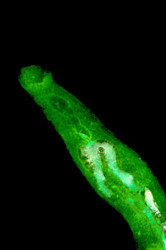Novel treatment for schistosomiasis
Caused by the blood parasite Schistosoma mansoni, schistosomiasis impacts physiological processes by modulating the host's immune responses. As a result, parasites infect the urinary tract and intestine, inducing a series of symptoms that — depending on severity and duration — could lead to organ failure. Disrupting the parasite's ability to evade or disrupt physiological processes by modulating specific molecules constitutes an attractive approach for treatment. Given that current options rely solely on the drug praziquantel, the key objective of the EU-funded 'Bioactive serine proteases from human parasite Schistosoma mansoni' (SCHISTOSOMA PROTEASE) project was to investigate yet not describe important bioactive molecules of the parasite. Scientists explored the option of targeting the parasite's proteolytic enzymes whose normal function is to break down other proteins in various processes. These proteolytic enzymes are highly similar to their mammalian counterparts. Thus, they can interfere with the hosts’ normal processes by facilitating immune evasion or affecting anticoagulation and vasodilatation. Researchers sequenced and verified the function of four S. mansoni proteolytic enzyme genes and determined their expression levels at different parasite life-cycle stages. High levels of these enzymes coincided with parasite host evasion, underscoring their importance in the host–parasite interaction. Selective silencing of these protease genes at the infective larvae stage (schistosomula) provided further evidence confirming their role in parasite infectivity. Researchers devoted significant efforts towards the production of recombinant proteolytic enzymes as well as the generation of antibodies against these molecules. A series of post-genomics analyses clarifies the complexity of schistosome proteases and highlights their interrelationships. A framework is now in place to guide the characterization of individual proteases, their stage-specific expression and their contributions to parasitism, in particular, their possible modulation of host physiology.These tools could serve as the basis for the drug/vaccine targeting of the S. mansoni. Overall, the SCHISTOSOMA PROTEASE study provided a scientific platform for the translational research and development of schistosomiasis therapeutic interventions.
Keywords
Schistosomiasis, proteolytic enzyme, schistosoma, infectious disease







